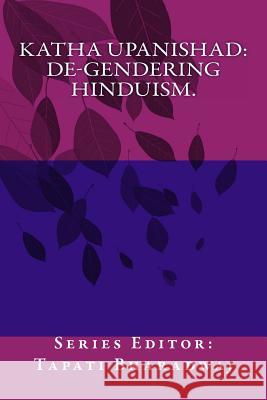KATHA UPANISHAD. De-gendering Hinduism. » książka
KATHA UPANISHAD. De-gendering Hinduism.
ISBN-13: 9789384281069 / Angielski / Miękka / 2015 / 254 str.
This rendition of an Upanishadic text is but a part of a larger series; the aim of this work is to construe Hindu religious texts as literature, and examine them within a gendered inflected analytical framework. What prevents us from examining the Upanishadic or the Vedic texts within a literary or a gendered perspective? If the basis of religion is "revealed knowledge," which was made evident to men - then is it not obvious that these notions of the Absolute Being would but be defined within gender inflected terminologies? The personal gender-biases of men would affect and predetermine how the notions of the Supreme Being were written about. Let me explain with an example from an Upanishad. In the Aitareya Upanishad, the first stanza reads in the following manner: "Om In the beginning this was but the Absolute Self alone. There was nothing else whatsoever that winked. It thought, 'Let Me create the world.'" We have to keep in mind that the Vedic texts are partially truthful - they are correct in their explanations on the notion of Absolute Consciousness which becomes matter, and there is no gender ascribed to this Absolute Being. The "Absolute Self" is denoted within gender neutral terms and is referred to as "It." But there is a slippage which occurs in the Vedic texts, making these texts suspect: it reveals the fact that those who were writing about this kind of revealed, divine knowledge were men and their interests are evident in how the notion of Absolute Consciousness is defined and described. In the same Vedic text, we will find gender specific characteristics of the Absolute Being. The second stanza of the Aitreya Upanishad reads in the following manner: "He created these worlds, viz. ambhas, marici, mara and apah. That which is beyond heaven is ambhas. Heaven is its support. The sky is marici. The earth is mara. The worlds that are below are the apah." A shift occurs whereby, "It" becomes "He" and we all assume, and accept, that the Absolute Being has to be male. To follow this statement to its conclusion, we can state that as the Vedic texts equate the "Absolute Self" with the masculine, men are seen as being agents; in the second part of the Aitreya Upanishad, the first stanza reads: "In man indeed is the soul first conceived"; the implication is that men are agents in determining the birth of children while women are mere passive receptacles.











